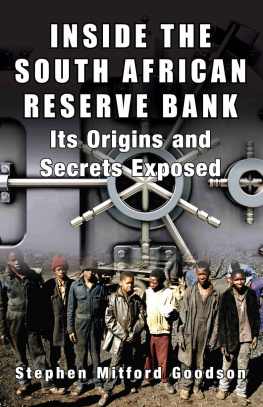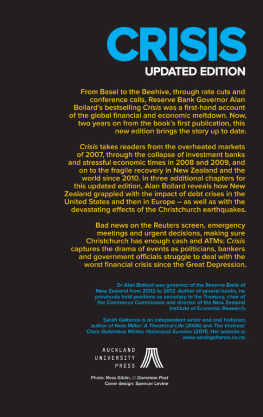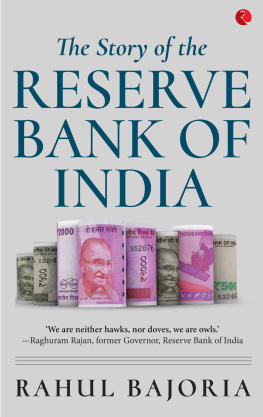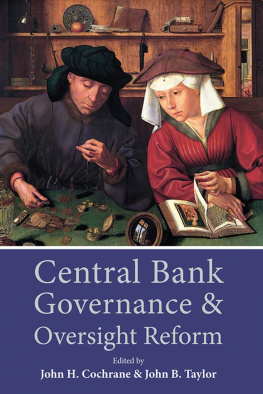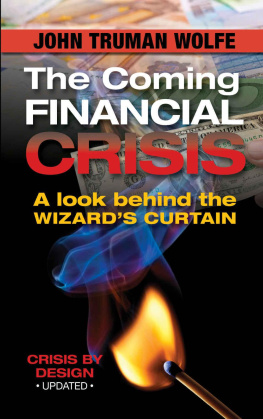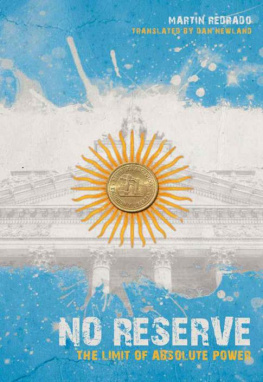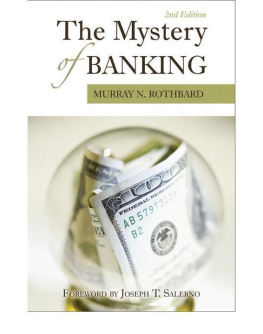Inside the
South African Reserve Bank
Its Origins and Secrets Exposed
by
Stephen Mitford Goodson
Inside the South African Reserve Bank
Its Origins and Secrets Exposed
by Stephen Mitford Goodson
Copyright 2014 Black House Publishing Ltd
All rights reserved. No part of this book may be reproduced in any form by any electronic or mechanical means including photocopying, recording, or information storage and retrieval without permission in writing from the publisher.
Black House Publishing Ltd
Kemp House
152 City Road
London, UNITED KINGDOM
EC1V 2NX
www.blackhousepublishing.com
Email:
This book is dedicated to
His Imperial Majesty
Tsar Alexander II
who on 12 June 1860 established by ukase the
State Bank of the Russian Empire
the largest and most beneficent state bank
in the history of the world.
The main mark of modern governments is that we do not
know who governs, de facto any more than de jure.
We see the politician and not his backer, or what is most
important of all, the banker of that backer.
Throned above all, in a manner without parallel
in all the past, is the veiled prophet of finance,
swaying all men by some sort of magic.
G. K. Chesterton
By the Same Author
General Jan Christian Smuts: The Debunking of a Myth
A History of Central Banking and the Enslavement of Mankind
Table of Contents
Foreword
It isnt what we dont know that gives us trouble;
It is what we know that isnt so.
Will Rogers
O nce in a while a book comes along which completely shatters a commonly held view about an institution that is considered as the custodian of a countrys monetary system by ensuring its economic health. Stephen Mitford Goodson has done the country a great favour by exploding this myth in his book, Inside the South African Reserve Bank Its Origins and Secrets Exposed. His shattering exposition of the despicable and immoral activities of the South African Reserve Bank demonstrates tremendous courage. The tragedy of our times is that few people are willing to stand up for truth as Goodson has done in his book. This detrimental malaise is best noted in the words of Edmund Burke who said, The only thing necessary for the triumph of evil is for good men to do nothing.
Speaking truth to power is not easy as people fear the repercussions that often follow. This is clearly evidenced in the actions of greedy money-lenders. They will do everything in their power to smear, malign and even persecute a whistle-blower so that people are distracted from the message that exposes their wrong-doing. For his efforts to expose the truth, Goodson has not escaped from persecution or getting his name maligned in the mainstream media.
One can cite numerous examples of people who were persecuted because they stood up for truth, righteousness and justice. The most notable example is that of Jesus Christ. Was he not persecuted for throwing out the greedy money-lenders from the synagogue? Were Mandela and Sisulu and a host of others who spoke out against apartheid not persecuted because they stood up for justice?
During the apartheid period, a handful of citizens like, Bram Fischer and Beyers Naude, emerged from within the White community, who, despite the privileges accorded to them, exposed the deception of the governments brainwashing that apartheid was justified by the Bible. For exposing the truth, they became outcasts in their own community. The critical element which made it possible for the wider White community to be swayed by the governments indoctrination that the Black majority must be dispossessed, subjugated and oppressed, was greed. That such a belief perverted Christianity was simply marginalised. That dispossessing the Black majority of their land and rights went against their own innate sense of righteousness was totally disregarded. Their greed dictated that they amass wealth even if it is at the expense of others and this became the driving focus to achieve their own covetous goal.
In this post-apartheid period, Stephen Goodson stands tall amongst those South African stalwarts like Nelson Mandela and Bram Fisher for standing up for righteousness and justice by exposing the nefarious monetary policies of the South African Reserve Bank. In this instance, it is the greed of the banks to accumulate wealth for themselves that is the driving force, regardless of who gets hurt in the process. Using practices which are both immoral and fraudulent, the banks have managed to gain the power to control the economy of the country. What is worse, the bank owners greed to achieve this wealth at any expense has resulted in seriously exacerbating the poverty levels in the country to a point that many have to go to bed hungry.
Considering the billions the banks are able to create by their Fractional Reserve System and other reprehensible activities, their actions become both deplorable and unforgivable. It is these kinds of crimes which legitimise the increasing calls made by many to abolish the Reserve Bank in its present form as a private institution which is neither responsible nor accountable to either government or the people. Goodsons book offers an alternative beneficial model to the current avaricious one that is continually widening the gap between the rich and the poor.
By granting commercial banks the right to create money out of nothing, the Reserve Bank allows the plutocrats to amass wealth which should rightfully belong to the people. That in this process innocent citizens are their primary victims is of little concern to the owners of the commercial banks. Their only concern is to ensure that the government and the countrys citizens will be forever enslaved through perpetual debt. Through this means, the bank owners aim to achieve their New World Order agenda which is to dominate and control the governments around the world. This agenda is exposed by the highly esteemed historian, Professor Carroll Quigley of Georgetown University, who, as an insider, had intimate knowledge of the private bank owners hidden agenda. He reveals:
The powers of financial capitalism had another far reaching aim, nothing less than to create a world system of financial control in private hands able to dominate the political system of each country and the economy of the world as a whole. This system was to be controlled in a feudalist fashion by the central banks of the world acting in concert, by secret agreements, arrived at in frequent private meetings and conferences. The apex of the system was the Bank for International Settlements in Basel, Switzerland; a private bank owned and controlled by the worlds central banks which were themselves private corporations. The growth of financial capitalism made possible a centralization of world economic control and use of this power for the direct benefit of financiers and the indirect injury of all other economic groups.
Any honest appraisal of the economic situation of most countries around the world would show that the bank owners have been very successful in accomplishing their hidden agenda to create that financial control in private hands able to dominate the political system of each country. The impact of such enslavement, in the words of Reginald McKenna, Chairman of the Midland Bank, would be that, those who control the credit of the nation direct the policy of Governments and hold in the hollow of their hands the destiny of the people. The consequences of such a situation would be dire for any nation as it would mean that any country which is beholden to the private bankers will never be truly free, independent or even democratic.
One of the merits of the book, Inside the South African Reserve Bank Its Origins and Secrets Exposed, is that Goodsons exposure is presented from the point of view of an insider, as both a shareholder and a former Director. Hence the information he provides must be taken seriously if citizens of South Africa wish to end their own enslavement. Failing this, the majority of South Africans will find themselves in the situation aptly described by President Thomas Jefferson of the United States who said in reference to the Second Bank of the United States that:
Next page
